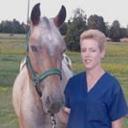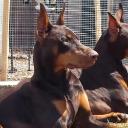Yahoo Answers is shutting down on May 4th, 2021 (Eastern Time) and beginning April 20th, 2021 (Eastern Time) the Yahoo Answers website will be in read-only mode. There will be no changes to other Yahoo properties or services, or your Yahoo account. You can find more information about the Yahoo Answers shutdown and how to download your data on this help page.
Trending News
Equine protozoal myeloencephalitis...and CATS?
A horse at my barn has contracted EPM. His owner is convinced that he contracted it from one of the barn cats, and really would like to see us get rid of all of them. I've scanned the Internet on articles about EPM and its transmission, and am a little confused by several contradictory articles. Most seem to suggest that cats are a POSSIBLE source, but that opossums still are the most likely vector. The thing is, people have used barn cats for rodent control since, well, forever. I don't think I've ever seen a barn WITHOUT cats. In the case of my barn, most of the cats have been there for a decade; there've been dozens of horses in and out, but this is the first case of EPM on the property. I don't want to be insensitive and argue with this owner; she's spending thousands to nurse her horse back to health, and he may never be right. But I just don't see the evidence that our cats made her horse sick, and I don't know what to say to her. (I really DON'T want to get rid of the cats either.) Somebody with veterinary knowledge, please tell me who's right and advise me on what to do.
@ Finley: I received a notification that you also answered this question, but your answer disappeared. I got the gist of it though, so thank you.
Thanks to everyone who responded. You've made me feel a bit easier, although nothing I can say is likely to convince this horse owner. I've resolved to make sure the barn staff does a more thorough job with securing feed/hay and maintaining overall cleanliness, and the barn owner is going to try to rehome a few of the friendliest cats. Sorry I can pick only one answer....
6 Answers
- CindyRVTLv 75 years agoFavorite Answer
Cats can serve as a reservoir for the parasite that causes EPM because they parasite can encyst in their muscles, but that is only important when the cat dies and is eaten by an opposum. For cats to put horses at risk, they must be eaten by a possum and then the protozoa that is ingested by the possum matures to the stage that is shed in possum feces and can cause infections in horses. Cats do not shed the protozoan parasite and do not transmit the disease directly to horses, therefore the barn cats are not the cause of the horse's disease.
Source(s): Licensed Veterinary Technician - DobiegalLv 75 years ago
no I think she's just looking for something to blame. I've never heard of cats being a vector, it's as you say, possums and possible birds that MIGHT carry it in flight, but that's a stretch, too
- Starlight 1Lv 75 years ago
First of all, Luke, I am sorry to hear about this horse getting sick. We just lost our oldest horse ( who would have been 33 years old on New Year's day) from EPM in mid August 2015. Like you, we have a barn cat, and he has lived in the barn for most of his life. Prior to this year with our oldest horse, there had never been any history of EPM at the farm I live on. Not even when my neighbor owned the place and ran it as a show and breeding barn, and they did that for decades without a problem. They also had cats that kept the rodent population down, as well as an occasional rat snake which would live in the loft during the summer months and help the cats out by preying on rats and mice that they didn't catch. ( I know he also ate the occasional barn swallow egg or chick, too, which helped keep that population down as well.) We still have the snake in the summer, too. He's wild, but he comes into the loft when it gets really hot outside and takes up residence there every now and then. Yes, he's scary to look at, but he's also harmless to us and to the horses. Neither the snake nor our barn cat has ever caused any horse to develop EPM or any other disease for that matter. The cat gets regular vaccinations against rabies and feline leukemia, along with other diseases that are vaccine preventable. He also gets treated for fleas and ticks on a regular basis- we just bring the flea stuff to the barn and put it on him.
None of us really know why our old horse got EPM. Even our vet couldn't be sure. The theory that my sister and I have is that he probably got it by drinking water out of the puddles at the back of the barn lot last winter, instead of drinking out of the water trough. The puddles could easily have been contaminated with opposum feces or urine, because there are wild animals that live in the woods at the back of the fields at our place, and they often come on our property in search of water or food. Horses contract EPM by drinking water or eating feedstuff that has been contaminated with oppossum urine or feces. Opposums are the main transmission vector for the disease, which is caused by a protozoa. A less common vector ( at least according to the research reports that I read after our horse died) is mosquitoes.
EPM is very hard and very costly to treat after it gets past a certain point. And while there are medications for it, they must be given in the early stages of the disease, because they tend to lose their effectiveness after awhile. You mentioned that this horse's owner is spending a lot of money to try and treat him- well, I hope for her sake that her vet has made her aware that she might very well be fighting a losing battle. She is going to need your support, for sure, because she's eventually going to have some very painful decisions to make. There's no reason why you should get rid of your barn cats, they aren't ones that made this woman's horse sick. The horse somehow got hold of either feed or water that was contamnated with opposum droppings or urine, and that was that. Killing or getting rid of the cats isn't the answer and wouldn't have prevented this from happening. Our vet was quite clear when it came to mentioning that the barn cat was not responsible for what happened to our horse. Opposums are large rodents. They're related to raccoons, and they can be just as viscious as many raccoons are. That a cat would not take one of these animals on is not really all that surprising, if you think about it. The odd time or two that I've ever found one of these creatures dead, it was usually because they'd been killed by something else, like perhaps a fox or a dog, or even a bobcat- we have those around our property too.
The boarder at your place is under a lot of stress and is very scared right now, I know- but somehow or other, you need to get your vet and her vet to impress upon her that the barn cats aren't reason why her horse is sick. NONE of the journal articles I saw or read after our horse died last August even MENTIONED cats as a possible transimission vector for EPM. Opposums, yes, mosquitoes as a lesser source, yes, but NOT CATS. And you know me well enough by now to know that I get my information about this kind of thing from reputable sources, such as the AVMA, for example, and the animal division of the CDC. I don't rely on or use Wikipedia or any of that stuff.
I hope that the sick horse gets better, but I do so with caution. EPM is such a fickle disease.
PS: Feel free to e-mail me ( off YA) and I will share whatever other information I can find about EPM.
- 5 years ago
It really is unfortunate that the lady's horse contracted EPM, and I hope he gets better. However, don't get rid of your cats. They're not the cause.
- How do you think about the answers? You can sign in to vote the answer.
- ?Lv 65 years ago
EPM or not Cats are by nature filthy germ laden creatures. They carry several known human disease carrying organisms. Easier to eradicate the rodents than add to.the filth with cats.








